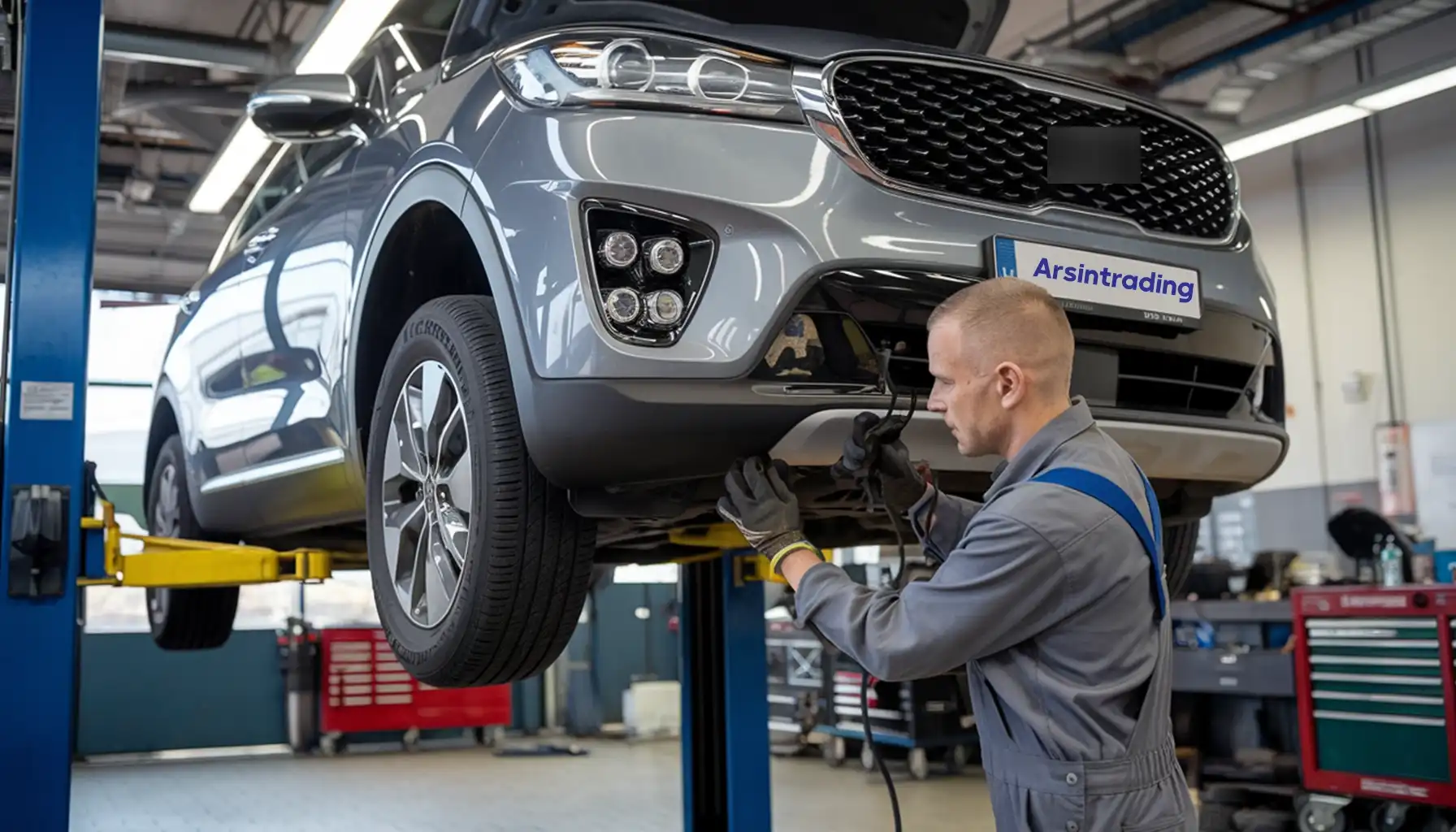In the 1st Part of our comprehensive Hyundai engine Oil guide covered the fundamental problems of choosing the right engine oil for Hyundai vehicles in the UAE’s extreme climate. It was explained that the very hot weather (up to 47°C), the sand particles, and the significant changes in humidity make a very difficult environment that forces engine oils to go to their absolute limits. The article also went through the absolute essentials – knowing what a 5W-30 viscosity grade means, understanding the importance of oil volume in the cases of 4-cylinder and 6-cylinder engines, and the reasons why the UAE needs oil with an extended additive package that is specifically made for the Middle East climate.
In this second part, we are analysing in detail the different Hyundai models that are the trend on the roads in the UAE. For example, the fuel-efficient Accent in Dubai’s stop-and-go traffic, the versatile Creta doing the city streets and the desert highways and so on. Every one of them has different lubrication issues which require different solutions. The section is full of Hyundai model-specific recommendations which provide more than just general advice by taking into account the particular engineering, the operational aspects, and the maintenance needs of the popular Hyundai vehicles such as Accent, Creta (both diesel and petrol variants), various generations of Elantra, and the compact Eon. Knowing such detail is vital to prolong engine life and keep the engine running at peak performance in the Gulf’s harsh conditions.
Best Engine Oil for Hyundai Accent Petrol: The City Warrior’s Choice
A good oil for a petrol Hyundai engine is one that does not end up sacrificing vehicle consumption for good engine protection. This is quite a paradox when circulating through the city of Dubai in a really slow traffic flow. The car using the Accent’s Gamma engine family should be filled with 5W-30 or 0W-30 fully synthetic oil, both of which help to provide less wear in the engine while also keeping high temp protection. These low viscosities enhance the fuel economy by alleviating the pumping losses which are critical if your everyday road trip is mostly the idling of the engine. However, do not get the idea that “lighter” means “weaker”; synthetic formulations of today usher in much more film strength than conventional oils with higher grades can.
Also Read about Oil Pump Failures
Owners of the Accent might be tempted to underestimate how hot their engines could get in the UAE. That little engine bay is probably one of the things causing the heat to build up like in a solar room thus the temperature of oil is pushed beyond that of which is found in larger vehicles. Well-heeled oils, for the vehicle in question, are equipped with the compound capable of preparing the lubrication film absorption in the first seconds of engine ignition – the moment when engine wear could be highest by up to 75%. This safeguard is thus extremely important to drivers from cities because such drivers rarely make deep trips and thus never allow their oil to get to the efficient operating temperature at which the by-products of moisture and fuel are dissipated.
Why Genuine Hyundai Accent Oil Filters UAE Matters?
Best Engine Oil for Hyundai Car: Model-Specific Excellence
Best Engine Oil for Hyundai Creta Diesel
Choosing the best oil for a petrol Hyundai Creta is mainly about giving priority to issues related to the buildup of soot and the protection of the turbo-an air intake system. The combustion of the pollutants inserted in the fuel for the diesel engines produces far more of such pollutants as compared with the petrol engines and this makes it imperative in oils for diesel engines to have intensified detergent packages so as to avoid the formation of sludge. In the UAE, with its dusty environs, this is turning into a very serious matter since the particles found in the air combine with soot in forming abrasive compounds that shorten the lifespan of a vehicle. Thus, low-SAPS 5W-30 or 5W-40 oils are recommended for contemporary diesel engines to keep the engines as well as the costly emissions control devices, e.g., the DPFs (Diesel Particulate Filters), in good health.
What you need to know about Korean SUV Oil Filters
At peak operation, the turbocompressor fitted with the Creta variable geometry system will produce more than 900 degrees Centigrade and to help keep it cool and lubricated it will be the engine oil alone.
At these temperatures, inferior oils will burn and turn carbonaceous deposits will form thus limiting the turbo’s movements and, ultimately, failure will ensue – the price of which would be more than a year’s worth of oil changes.As a result, we here at Arsintrading.com make a point of promoting OEM-grade oils that meet ACEA C3 or C4 criteria as our preferred choice for ensuring your Creta’s turbine stays in good condition for several hundred thousand kilometers to come.
Best Engine Oil for Hyundai Creta Petrol
What is best engine oil to use with a Hyundai Creta petrol? These cars need a different kind of engine oil than those for the diesel version. A 5W-30 fully synthetic oil that helps to keep the engine both protected and fuel-saving is what the 1.6L Gamma and the 2.0L Nu engines in the petrol Cretas need.
Indeed, these are the engines that operate at higher speeds than the diesel ones, thereby producing different patterns of wear and thermal loads. Besides, the oil still needs to be stable at 6,500 RPM while at the same time it should be able to offer the first layer of protection during cold starts – a task that only a quality synthetic oil is able to handle quite often.

Certainly, Petol Cretas can be a quite demanding of the powertrain in UAE. Loading them with passengers and cargo in the blazing sun is what sometimes drives these vehicles. In such a combination of factors, there is a considerable risk of overuse of the engine oil and that is why it is of great importance to have formulations that show good resistance to oxidizing. These oils must be accompanied with such additives as molybdenum or titanium which will create layers on the surface of the metals that will be a protection against wear. These advanced additives are not cheap, however, the result of their action is longer engine life and thus retention of the vehicle’s value.
Best Engine Oil for Hyundai Elantra: Precision for Performance
Best Engine Oil for Hyundai Elantra 2013
What is the best engine oil for the 2013 Hyundai Elantra? The solution to this question lies in the way addressing the particular requirements of 1.8L NU engine which was equipped with dual CVVT (Continuously Variable Valve Timing) that needs oil to be put under a precise pressure in order to work properly.
These fifth-generation Elantras are most receptive to 5W-30 or 5W-20 synthetic blend and fully synthetic oils that keep viscosity at a reasonable level even when undergoing temperature changes.
CVVT system uses oil pressure to tune valve timing for peak performance and lower emissions, thus the system is very oil quality sensitive and changes in oil quality have direct impacts on overall engine efficiency level.
The 2013 model of Elantra is an example of a car that is prone to higher mileage and is more often in the same situation as in the UAE, a place where long highway trips are normal. High-mileage formulations with seal conditioners allow the engine to be leak-free and at the same time be protected even though some parts are already worn out. These oils have some extra zinc and phosphorous in them which through the formation of protective layers on the wear surfaces help the metal works which become “invisible” to micrometric levels as the lifespan of the engine is prolonged.
However, it is of utmost importance to have good control over the amount of additives too – excessive contents of these compounds can bring about the destruction of catalytic converters, thus following OEM specifications must be an absolute prerequisite.
Best Engine Oil for Hyundai Elantra
A modern Elantra calls for top-notch engine oil for Hyundai Elantra that is usually 0W-20 or 5W-30 depending on the model year and the engine type. The newest Smartstream engines are equipped with the highly efficient technologies such as Dual Port Injection and Integrated Thermal Management which require oils with very specific friction characteristics. The manufacturers are not just recommending these – using wrong viscosity can not only void the warranty but also lower the fuel economy by as much as 5%. The oil has to be light enough to go rapidly to the turbocharger bearings (in Sport models) and at the same time of a sufficient strength to allow naturally aspirated variants to operate safely.
what is the most common Hyundai Elentra problems?
The Elantra is a small premium sedan, so the owners expect refinement and efficiency. Qualitative engine oils make both possible by muffle mechanical noise and increase fuel economy. The UAE’s sedan market is very competitive and therefore the maintenance done on your Elantra by using the right oil is what will enable it to keep the smooth, quiet operation that makes it stand out from the less attractive alternatives. Besides, this careful taking care of your car also helps maintain the resale price in a market where buyers are very thorough with the checking of the service histories.
Best Engine Oil for Hyundai Eon: Protecting the Urban Runner
The best engine oil for Hyundai Eon has to be the one that will shield a tough 0.8L or 1.0L engine that is able to outperform its weight class on daily basis. These very small engines turn more times per minute than bigger engines to develop sufficient power, thereby posing some difficult lubrication problems. 5W-30 semi-synthetic or full synthetic oils are what should be used since they can provide the necessary film strength at high RPM and yet maintain fuel efficiency which is very important for owners who are on a tight budget. As for the Eon’s engine compartment, it is so tightly packed that there is almost no room for the heat to dissipate, hence oil quality becomes very important for the engine’s lifespan.

While being the most inexpensive of the bunch, the Eon engine has been designed with advanced features such as aluminum block and roller rocker arms and thus it requires good lubrication. If in these small engines you are taking chances with oil quality, then you are in for a big loss — because their oil capacity is smaller, the contaminants concentration will be higher and so the wear process will accelerate. The wise Eon owners know that paying a little more for good oil is way cheaper than having to change the engine prematurely, especially in the Emirates where such cars are the most common type of delivery vehicles destined to the severe service conditions.
Conclusion
Choosing the appropriate engine oil for your Hyundai model in the UAE involves a lot more than just matching viscosity grades-it requires a thorough understanding of the vehicle’s design features and the way it is being used. For instance, running an Accent in the busy streets of Dubai, driving a diesel Creta along the desert highways, taking care of a high-mileage 2013 Elantra, or getting the most out of a fuel-efficient Eon-all examples are situations where each vehicle needs lubricants that are not only compatible but also capable of solving the problems presented by our harsh climate.
The main point of this model-specific guide is that, although Hyundai engines are generally reliable and efficient, they are still precision instruments that demand precise lubrication. The compact engine bay of the Accent generates a lot of heat which calls for oils that have excellent thermal stability. To eject particulate matter and keep the turbocharger safe from carbonization at 900°C, the Creta diesel variant requires special formulations. The Elantra’s CVVT systems get their optimum performance from oil pressure that is constant, while the Eon’s small displacement engine that is labor-intensive yet budget-friendly needs to have its film strength be of the highest quality.
Under the extreme conditions of the UAE automotive market where the wear processes get sped up and substandard oils may cause the engine to fail in a frightening manner, investing in the right oil specification for your particular Hyundai model ought to be regarded not merely as maintenance but as the engine’s premature failure insurance. As it has been demonstrated, the difference between using a generic oil and the right model-specific formulation can be the outcome of the engine’s lifespan serving reliably for 300,000 kilometers versus breaking down at half that distance.
We have more to go! Part 3 will be a deep dive into the oil requirements of more Hyundai models such as the petrol variant of the Grand i10, the local industry H100, along with the entire i10 and i20 series. These models, each with their unique engineering solutions and operational profiles, require equally specific lubrication strategies to thrive in the Middle Eastern environment.
Frequently Asked Questions
Is it safe to use 0W-20 oil instead of 5W-30 in my Hyundai if it improves fuel economy?
Don’t change oil viscosities on your own without first checking the owner’s manual or getting advice from a qualified technician. Using a 0W-20 oil is recommended only for a Smartstream engine in a modern Elantra, but if you put that ultra-light oil in an older model that requires 5W-30, you risk serious engine damage, especially in a hot place like the UAE.<br>The thin oil may fail to provide enough film strength at high temperatures, resulting in metal-to-metal contact and increased wear. Some models are specially programmed in their ECUs to expect certain oil viscosities, and if you use the wrong one, it might cause warning lights or affect variable valve timing. Manufacturer specifications should always be honored first, even if a bit of fuel economy can be gained. The money saved on fuel won’t be enough to pay for a damaged engine.
Why does my Hyundai Creta diesel require different oil than the petrol version, and can I use the same oil for both?
The main difference between diesel and petrol engines is the way the combustion happens, which leads to a need for different oil formulations. Diesel engines emit a lot of soot and other combustion byproducts, thus the oil has to contain more detergents to prevent sludge formation. Diesel-specific oils should also be able to cool and lubricate turbochargers that operate at very high temperatures (over 900°C), and they have to be low-SAPS to keep DPF and other emission control devices safe. A petrol engine oil used in a diesel Creta will cause soot to build up quickly, and the turbo will overheat and fail, and the DPF will get clogged. In the other hand, if diesel oil is put into a petrol engine, it is less damaging but still a waste of money since the engine will not need some of the additives you are paying for. The best way to ensure a long engine life and optimal performance is to always use the oil that is specified for your engine type.
How do I know if my high-mileage Hyundai needs a different oil formula than when it was new?
It is quite common that vehicles with over 100,000 km will benefit from oil formulations that are designed for high mileage, particularly in the harsh environment of the UAE. Your Hyundai might be in need of high-mileage oil if you see: minor oil leaks or seepage around gaskets, increased oil consumption between changes, the engine becoming slightly noisier, or if you can see wear from oil analysis. High-mileage oils have added seal conditioners that work on rejuvenating aging gaskets and more zinc and phosphorus to protect the worn surfaces. On the other hand, if your engine is properly maintained and no problems are evident, it is still OK to continue using the oil recommended by the manufacturer. In such cases as the 2013 Elantra, which is used as an example in this guide, high-mileage formulations can play a crucial role in CVVT system performance as internal wear and tear gradually increases.



